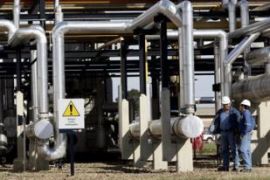Bolivia’s gas exports threatened
Demonstrators overwhelm soldiers to seize facility controlling pipeline to Argentina.

The protesters’s seizure of the plant comes after two neighbouring districts disputed the government’s allocation of the revenues from one of the country’s largest gas reserves.
Gas claim
The districts of Gran Chaco and O’Connor in Bolivia’s Tarija province both argue that they have the right a larger share of the revenues from the large Margarita natural gas field.
The field is operated by Spain‘s Repsol-YPF and is expected to generate millions of dollars in state revenue in the coming years.
Mario Cossio, Tarija’s governor, is to rule on which of the two districts will have the right to 45 per cent of the approximately $100 million in annual taxes that be generated from future exports of Margarita’s reserves to Argentina.
Political and civic leaders in Gran Chaco had previously threatened to occupy gas fields or take over pipeline control stations to cut exports.
The protesters have refused to negotiate with a government delegation that travelled to the region from La Paz, Bolivia’s administrative capital.
Industry nationalised
Repsol-YPF, Brazil‘s Petrobras and France‘s Total operate different natural gas fields in Tarija, where 80 per cent of Bolivia‘s natural gas reserves are situated.
Protests began last week in Gran Chaco with hunger strikes by politicians and city officials, and were followed Monday with blockades at border crossings to Argentina and Paraguay.
Bolivia nationalised its energy industry a year ago, forcing foreign operators to pay much higher taxes.
The government expects Bolivia‘s 30 million cubic metres a day of natural gas exports to Argentina and Brazil to reach an annual value of $2bn this year.
Bolivia put Tarija’s natural gas fields and pipelines under military control on Monday to deter potential protests that could affect exports to Brazil and Argentina.